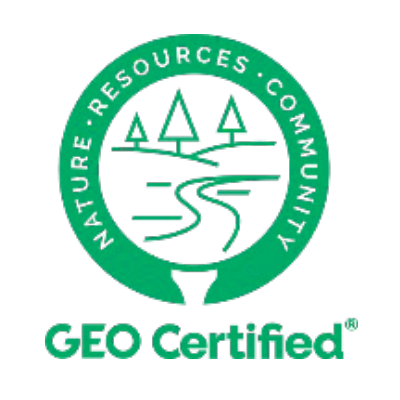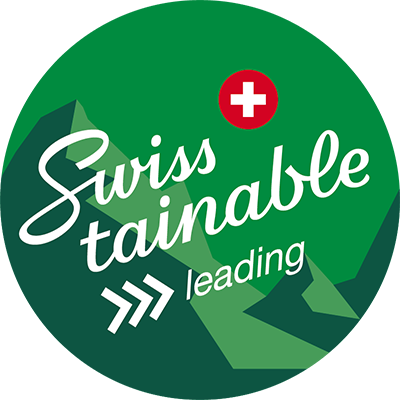Our commitment
Definitions
The origin of the definition of sustainability as we understand it today dates back to a 1987 United Nations Commission on Environment and Development report (the Brundtland Commission Report). This described sustainable development as "development that meets the needs of the present without compromising the ability of future generations to meet their own needs". The sustainable development approach rests on three distinct but interdependent pillars: ecology, economy and society.
Sustainable development and golf
Golf keeps pace with the times and is not standing still in the face of climate change and the challenges of sustainable development. Actions can be summed up as follows :
- Encouraging nature and biodiversity -> golf courses are living landscapes and can contribute to the flourishing of flora and fauna, by creating and protecting valuable habitats and ecosystems. This also involves reducing and eventually eliminating inputs that are dangerous and harmful to ecosystems.
- Conserving resources -> golf clubs operate like a business, with their own processes and flows, so they need to better control and reduce their use of resources, whether it is water, energy, chemicals or recycling of waste (food or other).
- Strengthening communities -> Golf can provide a range of social values, including healthy recreation, a welcoming and inclusive environment, and strong links with local communities.
Underpinning this is the desire to help achieve the United Nations' Sustainable Development Goals (SDGs) and aim for neutrality in terms of environmental impact.
Our commitment
The Golf Club de Lausanne's commitment to sustainability dates back several years, and has been resolutely pursued by the Committee, the Management, and teams on the course, under the leadership of the Head Greenkeeper, who have made it a strategic priority. The club has set up a GEO committee to oversee the certification process and support the implementation of various projects and improvement initiatives. We, as many others, are firmly convinced of the need to be proactive in managing our golf course as sustainably as possible, both in terms of the course and the management of the club in general.
The Golf Club de Lausanne's medium-term objective is to gradually become an "organic course", with maintenance free from synthetic products and pesticides. To achieve this, we are fostering contacts in Switzerland and abroad to share our experience of course management. This will enable us to discover new substitutes for pesticides, which are on their way out.
The Golf Club de Lausanne can rightly be considered one of the pioneers in Switzerland thanks to the implementation of tangible measures aimed at sustainable management and development, through a commitment to the following 5 priority areas :
- Environmental certification : The Golf Club de Lausanne is GEO certified, an international standard that acknowledges golf clubs for their commitment to sustainability and environmental protection.
- Treatments and products : The Golf Club de Lausanne is pursuing a transition that should lead to the elimination of phytosanitary products by 2030, including a change in the type of grass used.
- Biodiversity : The Golf Club de Lausanne has taken steps to protect and promote biodiversity on its course through a series of initiatives affecting both flora and fauna.
- Resource management : The Golf Club de Lausanne strives to reduce its water and energy consumption by using sustainable and renewable management techniques and by investing in energy-saving equipment. It has also introduced a waste management policy to minimise its environmental impact.
- Raising awareness : The Golf Club de Lausanne aims to raise awareness among its members and visitors of the importance of sustainability and environmental protection. It organises educational events and activities to promote nature conservation.
GEO Certification
Aware of the urgency and importance of making golf part of a sustainable development approach, Swiss Golf has entered into a partnership with the GEO Foundation for Sustainable Golf, an international not-for-profit organisation originating from the R&A and whose certification label, recognised by the ISEAL Alliance, has been chosen for use by Swiss golf clubs.
For several years now, the name GEO has been part of the vocabulary of Swiss golfers in general and of the members of the Golf Club de Lausanne in particular, which, as a precursor, was certified for the first time in July 2018 and re-certified in October 2021, thus confirming that it is on the right track and progressing successfully.
To date, the Golf Club de Lausanne is one of around fifty (out of a hundred) Swiss Golf member clubs already certified, and Swiss Golf's aim is to have them all certified by 2027.
The GEO certification label rests on the 3 major pillars of sustainable development: environmental, social and economic. The GEO Foundation has developed and adapted them to the major issues facing golf facilities: nature, water, energy, supply chain, pollution management and community.
Obtaining this eco-label enables us to carry out a complete assessment of the 'system' around the management of golf clubs and courses. It provides a clearer picture of the course’s assets and constraints, while highlighting possible scenarios for improvement, such as optimising maintenance costs, redesigning certain holes or areas, improving communication with players, etc.
For the Golf Club de Lausanne, this certification is the logical next step in a long-term commitment to sustainability. But it is also a guarantee of quality and seriousness to all stakeholders, whether members, local authorities who own the land on which the golf course is located, or even the general public, all of whom are increasingly aware of the need for environmentally responsible management.
However, this certification is not an end in itself, but is accompanied by a series of initiatives and improvement projects relating to the course, the conservation of nature and biodiversity, the management of our resources and the involvement of our members, as the list of actions undertaken to date shows :
- 2000 : Waste treatment and sorting of cardboard/paper, PET, glass and treatment of kitchen waste.
- 2007 : Creation of the first natural meadows or flower meadows (3.5 hectares). The meadows are not fertilised and are mown late.
- 2010 : Installation of 14 nesting boxes (now 35) for the 60 species of birds found along the course.
- 2011 : Replacement of the oil-fired boiler at the Antets farm with a pellet-fired boiler.
- 2012 : Planting native hedges to encourage wildlife (to be continued in 2020).
- 2013 : Contract with a consultancy (STRI : Sport Turf Research Institute) for turf analysis and reduction of fertiliser and pesticide use.
- 2014 : Implementation of a woodland management plan (2014-2024) for trees located in the commune of Epalinges, with tree planting, pruning or felling work carried out in agreement with the relevant authorities.
- 2014 : Extension of the flower meadows to 5 hectares. The cut grass is offered as fodder to a neighbouring farmer.
- 2015 : Investment in a more efficient computerised irrigation system, that takes into account local weather and soil moisture, with management allowing individual control of the 850 sprinklers distributed solely over the playing areas.
- From 2015 : Production of apple brandy from the fruit of our orchard.
- 2016 : Installation of the first beehive to produce local honey.
- 2016 : Launch of the "mulching" technique to recycle organic waste and avoid systematically sending it to the waste collection centre.
- From 2016 : Gradual replacement of grass species on our greens (overseeding with Agrostis (bentgrass) to eliminate bluegrass). This grass species requires less fertiliser and water, and is more resistant to disease.
- 2017 : Addition of 2 beehives for a total of 3.
- 2017 : Installation of photovoltaic panels on the roof of the machinery shed, generating approximately 28,000 kWh/year.
- 2017 : Modification of a pond at hole 4 to encourage amphibian reproduction. This approach will be continued with the creation of two new specific ponds in 2019 (hole 3) and 2020 (hole 14).
- 2018 : Change of use for the flower meadows on the course, which are now protected ecological zones and off-limits to visitors.
- 2018 : Creation of a commission specifically dedicated to Sustainable Development.
- 2018 : Certification by the GEO Foundation. The Golf Club de Lausanne is the 4th Swiss club to be awarded the GEO label.
- 2018 : Implementation of the woodland management plan (2018-2028) for golf course territory located in the City of Lausanne.
- 2018 : Discontinuation of fungicide applications to fairway areas.
- 2019 : Installation of an additional beehive, bringing the total to 4.
- 2019 : Implementation of an energy study on the clubhouse buildings, CECB +, with a view to reducing and optimising our energy consumption.
- 2020 : Installation of the fifth beehive by duplicating an existing one, bringing the total number of beehives to 5.
- 2020 : Study of irrigation management with hydrology specialists, to make better use of the available water, in collaboration with the Water Department of the City of Lausanne.
- 2020 : Creation of a high-stem orchard with 26 fruit trees of ancient native species, in collaboration with Rétropomme.
- 2020 : Production of apple juice from our orchard.
- 2020 : Use of organic or organo-mineral fertilisers to fertilise the turf.
- 2020 : Energy assessment of the clubhouse.
- 2020 : Establishment of an environmental impact assessment by Swiss Golf, in collaboration with the Wylihof Golf Club, to improve knowledge of the club's strengths and weaknesses.
- 2020 : Bird census on the course. The surveys were sent to the ornithological service in Sempach.
- 2020 : Installation of a new machine washing station with recovery/filtration of oils and other pollutants.
- 2020 : End of fungicide use on the tees.
- 2020 : Construction of an amphibian pond between holes 14 and 15 with the help of Pro Natura.
- 2021 : Re-certification in October 2021 by the GEO Foundation.
- 2021 : Planting of a grove of native shrubs behind the new pond created in 2020 at hole 14, funded by the Ladies' Group.
- 2021 : Installation of 10 nesting boxes for western house martins on Antets farm.
- 2022 : Replacement of the oil-fired boiler in the clubhouse with a pellet-fired boiler.
- 2022 : Execution of a waste management audit with Swiss Recycling.
- 2022 : Energy renovation of the Golf Club de Lausanne: project under study for a photovoltaic installation with infrastructure for electric vehicle charging points.
- 2022 : Expansion of protected ecological zones to which access is prohibited.
- 2022 : Reduction in the use of fungicides on the greens, with a target of zero use of pesticide by 2030.
- 2022 : Census and monitoring of protected species : bats and amphibians.
- 2023 : Census of various insects on the course.
- 2023 : Installation of bat nesting boxes.
- 2024 : Flora census of our ecological zones.
- 2024 : Planting of 2 native hedges.
Today, sustainability is no longer a vision, but a reality in which the Golf Club de Lausanne aims to develop and excel as it does on the sporting scene.
Swisstainable
Following the renewal of our GEO certificate in October 2021, on 13 January 2022 we were awarded level III certification for Swisstainable, the sustainability programme of Switzerland Tourism, as we already have a comprehensive and recognised sustainability certification.


